
Astone’s throw away from Montreal’s busiest speedways, tomatoes, peppers
and eggplants are growing in a commercial-size rooftop greenhouse.
Farming in the city is no longer a fantasy.
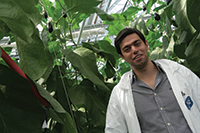
|
|
| Lufa tomatoes; (top) founder Mohamed Hage has a vision of “ a city of rooftop farms.” |
Astone’s throw away from Montreal’s busiest speedways, tomatoes, peppers and eggplants are growing in a commercial-size rooftop greenhouse. Farming in the city is no longer a fantasy.
On one side, tomatoes and eggplants are growing four metres high. On the other, a variety of lettuces and other leafy vegetables, with storefronts bearing names like Golf Town, Pier 1 Imports and Future Shop as a backdrop. This is definitely not a greenhouse like most others.
We are on a commercial roof steps away from Marché Central, a new shopping complex next to Montreal’s wholesale fruit and vegetable market. Computer wiz Mohamed Hage has chosen this location to become a farmer.
FRESH PRODUCE NOW GROWN IN THE HEART OF THE CITY
What was merely a vague idea four years ago has turned into a local sensation: fresh produce grown in the heart of the city, delivered daily to consumers who can be either tenants of the same building, workers in a ten-storey glass building around the corner, or attorneys in a downtown law firm.
Hage was born in Lebanon 29 years ago, in a tiny village where tomatoes are more important than olives. “All I see from my window in Lebanon is tomato greenhouses,” he told Greenhouse Canada during a private tour of what is billed as the world’s first large-scale rooftop commercial greenhouse.
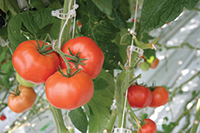
|
|
Hage immigrated to Canada when he was 12. Computers and software caught his attention, but “my interest has always been agriculture,” he says. Running a software company for 10 years has enhanced his entrepreneurial skills.
Today, he’s running a 10-employee start-up, with quite a lot of technology involved. And guess who’s programming the automated climate control?
The idea grew from questioning the freshness and the origin of the fruit and vegetables that make it every day into Montreal’s supermarkets. Why should produce travel so far, when it could be grown close by, capturing a building’s heat in the winter and keeping it cool in the summer?
ADVICE FROM CROP EXPERTS FROM McGILL UNIVERSITY
Talking to friends and family, he began making plans for the project. Experts were called in, namely from McGill University. A location was found, the greenhouse was designed and construction was completed in the fall of 2010. Today, some 150 varieties of vegetables and herbs are grown in the same house, and 650 households are supplied with a weekly basket of ripe produce.
“Our goal is to eliminate the distance between the producer and the consumer,” says the founder of Lufa Farms.
“We truly believe that we can grow vegetables in the city and that they will be nutritious and healthy.”
Hage’s 31,000-square-feet rooftop greenhouse is not an attempt at growing more food for less money. “We’re not going after yields,” he says.
The glass greenhouse uses all available modern technology and equipment: drip irrigation, water and nutrient recirculation, natural gas boiler with hot water pipes running above the ground, energy curtains and electronic climate control.
What also sets this facility apart is that fact that’s it’s a polyculture. Temperature, humidity levels and pest control have to be tweaked to suit the largest number of plants. “If we were only doing cucumbers or tomatoes, it would be much easier,” Hage says.
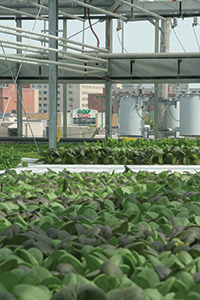
|
|
| Lufa’s first rooftop greenhouse offers vistas over the big box stores at Montreal’s Marché Central shopping complex.
|
TEMPERATURE ZONES FOR DIFFERENT CROPS
Tomatoes, peppers, eggplants and some herbs are kept on the “warm” side of the greenhouse. Lettuces and seedlings share a cooler environment. All take advantage of the city’s higher CO2 levels.
A stone’s throw away from where highways 40 and 15 merge, air quality is perfectly suitable for growing vegetables, says Yourianne Plante, head of community relations. At the height of the third floor of a commercial building, air contaminants are different, but not any worse than at ground level on the outskirts of Montreal’s suburbs, Plante insists.
No herbicides or pesticides are used, yet the production is not meant to qualify for an organic certification. Despite all the brick, cement and asphalt in the area, insect pests are abundant, Plante says. They are controlled with the usual biological controls.
The greenhouse’s design was not only adapted to polyculture. It had to comply with urban construction and fire regulations. Since it qualifies as a third floor, its structure had to be sturdy enough to support a real roof. In case of fire, sprinklers are in place and workers have a choice of staircases leading to emergency exits.
Tenants in the same building include a school uniform supplier and a furniture store. At first, many were skeptical at the idea of having plants watered every day one floor above. Today, they are among the enthusiastic clients picking up their weekly box of fresh vegetables on site, climbing to Lufa Farms’ second-floor office and basket assembly room.
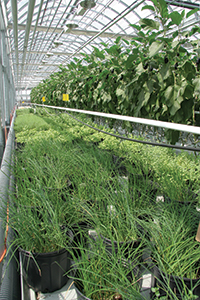
|
|
| The 31,000-square-foot greenhouse is home to up to 150 vegetable and herb varieties, growing in two separate sections.
|
STRAIGHT TO THE CONSUMER; IT’S AS FRESH AS IT GETS
Vegetable sales kicked off last April. The entire production is sold directly to “subscribers,” except for a limited number of special orders from local chefs.
Five mornings a week, the production team picks the exact quantity of produce required to assemble the baskets (reusable boxes) for the day’s deliveries. In the afternoon, the farm’s truck delivers to drop-off locations, the farthest one being 15 kilometres away.
The small basket sells for $22. It contains tomatoes, lettuce, peppers, and other vegetables and herbs that vary every day. Subscribers may purchase a larger basket. As an option, they may also receive seasonal field vegetables supplied by organic farmers close to Montreal.
Clients subscribe on an individual basis, ordering and paying on the Internet. They may choose from any of some 25 existing drop-off locations, located in “Eco-quartiers” (neighbourhood eco-centres), community centres or private workplaces.
Those who wish to establish a new drop-off location call Yourianne Plante. A tasting is organized, and when 20 subscribers are registered to receive their baskets at that location, weekly deliveries may start. “It’s really when people taste the vegetables that they choose to subscribe,” Plante says.
Lufa’s business plan does not interfere with the existing organic produce basket network, Plante says. “Organic producers (that deliver baskets in Montreal) can’t keep up with demand. None of them serves our borough of Ahuntsic-Cartierville and this is where we have a third of our subscribers.”
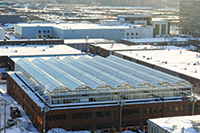
|
|
VEGETABLE AND HERB BASKETS WILL BE DELIVERED YEAR-ROUND
Lufa Farms’ baskets will be delivered year-round. Production during the colder months will be somewhat trickier, but subscribers should keep receiving their fresh, diversified and local vegetables without interruption.
Selling straight to consumers – with no go-between – is the only possible way to make such a diversified greenhouse production viable, Hage says. Simplicity is the key: picked and delivered the same day, the produce suffers very little manipulation, remains fresh and travels very little.
Cultivars were chosen for taste and texture, many of them being heirloom varieties. Such produce is usually not expected to remain firm and good-looking throughout long hours or days on the road, in warehouses or on store shelves.
“We pick our vegetables when they are ripe,” Hage says. “They are delicious, but some are very delicate.”
Lufa Farms has demonstrated that growing a variety of vegetables in the same greenhouse can be achieved, Hage says. “It’s a concept that we believe is here to stay.”
Is it profitable? Not yet, Hage says. “By expanding the model and by having multiple greenhouses, we believe that this will become a profitable formula.”
Lufa Farms is currently looking for investors. A second location in Montreal is being considered. Will its “vision of a city of rooftop farms” become reality?
| More projects on drawing board
Lufa Farms Inc., creator of the world’s first commercial-scale rooftop greenhouse, is now working with green industrial-park specialist Le Groupe Montoni of Laval to develop LEED-certified industrial buildings capable of supporting commercial greenhouses. The agreement is expected to result in several new rooftop farms in and around Montreal, beginning next year. Mohamed Hage, president and founder of Lufa Farms, said the company’s next rooftop greenhouse in the Montreal area would be constructed on a Montoni building roof, and should begin operations in mid-2012. Lufa’s first commercial greenhouse, which sits atop a roof in Ahuntsic-Cartierville, measures 31,000 square feet. “This is an important partnership for two reasons,” said Hage. ”First, Le Groupe Montoni has demonstrated a consistent commitment to LEED and responsible building development that makes them a perfect partner on which to build our urban farms. Second, as a company that builds more than 1.5 million square feet of space every year, we see this as providing platforms for several additional large-scale rooftop farms in the next few years.” For Le Groupe Montoni, working with Lufa Farms is consistent with its commitment to LEED-innovative industrial projects. “Enabled by Lufa Farms greenhouses, our buildings will be able to achieve new levels of energy efficiency,” said Dario Montoni, president and chief executive of Le Groupe Montoni, which recently completed one of the nation’s first LEED-certified industrial parks in Ville St-Laurent. “We see this becoming a model for an entirely new type of industrial parks that are clean, energy-efficient, and an important part of the greater community.” In Ahuntsic-Cartierville, Lufa Farms grows a large selection of tomatoes, cucumbers, peppers, greens, herbs and other vegetables and sells them direct to customers around Montreal through a distribution network of “drop points.” More than 700 households currently subscribe to Lufa Farms vegetable baskets. The new, larger greenhouses to be built with Montoni are expected to serve as many as 5,000 households each. Founded in 1995, Groupe Montoni Division Construction Inc. is a leader in the commercial and industrial sectors. Since 2001, it was one of 50 best-managed private companies in Canada and joined the Platinum Club in 2007. The Montoni staff is known in the industry for the design and construction of sustainable buildings and systems, and resources and processes for the evaluation of LEED Canada sustainable buildings. For more information please visit: http://www.groupemontoni.com . The first Lufa Farms greenhouse is located on the rooftop at 1400 Antonio-Barbeau near the Marche Central. For more information, consumers may visit https://lufa.com/ , call 514-669-3559, or e-mail info@lufa.com . |
||
Print this page